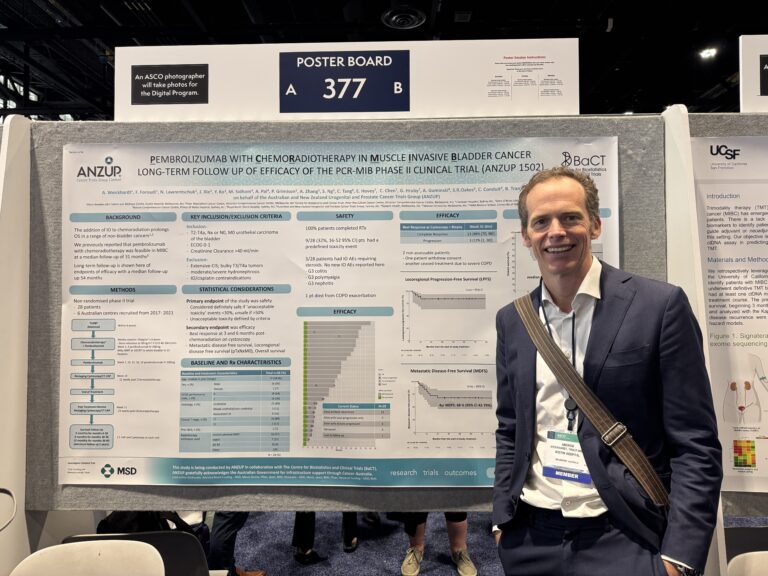ANZUP at ASCO 2025 – PCR-MIB
PCR-MIB
Background
Bladder cancer starts in the bladder, the organ that holds urine, and is a relatively common cancer affecting around 5,000 Australian and New Zealand people every year¹,².
Urothelial cancer is the most common type of bladder cancer that begins in the lining of the urinary tract – and involves the bladder, as well as the tubes that connect the kidneys to the bladder (ureters), and the part of the kidney that collects urine.
While we have seen improvements in the relative survival rate of other cancers thanks to life-improving research, the same is not true for bladder cancer; with only 57% of people affected by bladder cancer expected to meet their five-year milestone. Therefore, new therapeutic strategies for bladder cancer are desperately needed.
About the trial
Opened in mid-2016, this trial is aimed at managing bladder cancer that has spread into the wall of the bladder. A combination of chemotherapy and radiotherapy is the current standard treatment.
ANZUP’s PCR-MIB trial tested whether the combination of pembrolizumab together with chemotherapy and radiation was safe and effective.
Pembrolizumab is a type of immunotherapy that targets a marker on immune cells, called PD-1, and ‘takes the brakes off’ the immune system allowing the body’s immune system to recognise and attack cancer cells. Pembrolizumab can be used to treat locally advanced bladder cancer (cancers that have spread to nearby tissues) and metastatic bladder cancer (cancers that have spread out of the bladder wall and to other organs) effectively. There is some evidence that pembrolizumab can be added to either chemotherapy or radiation to improve tumour responses in people affected by metastatic bladder cancer, however the combination of all three treatments has not yet been tested.
Publication
In results published in the prestigious European Association of Urology journal in 2024, the combination treatment proved feasible with 88% of participants with bladder cancer experiencing a complete response to treatment after 24 weeks and 78% of participants free of spread to distant organs at 2 years. The results of this trial warrant further research to explore the clinical benefits of this combination in larger trials to prove that this combination approach is better than other standard of care treatment strategies.
Poster presentation at ASCO 2025

Poster presentation by A/Prof Andrew Weickhardt. The PCR-MIB trial has previously shown that the combination of the immunotherapy pembrolizumab together with chemotherapy and radiation was safe and effective with results showing that 88% of participants with urothelial bladder cancer experiencing a complete response to treatment after 24 weeks and 78% of participants free of spread to distant organs at 2 years. Here Prof Weickhardt presents the results of long-term follow up of this trial. After a median of 54 months follow up, no new safety or immunotherapy related side effects were identified. At 48 months, 68% of participants were free of disease progression to distant organs and 64% were still alive. The promising results of this trial warrant further research to explore the clinical benefits of this combination in larger trials and to show that the combination is better than other standard of care treatment strategies.
References:
- Cancer Data in Australia, Australian Institute of Health and Welfare (AIHW) 2024
- New Zealand Cancer Registry (NZCR), Health New Zealand-Te Whatu Ora
